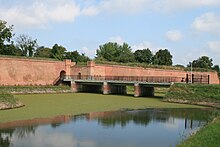Bruno Ernst Buchrucker
[1] On 20 March 1911 he was promoted to captain and became head of a company of infantry stationed in Alsace–Lorraine, which had been annexed from France by Germany in 1871 as a result of the Franco-Prussian War.
At the beginning of the First World War, he was assigned as a staff officer to the XIV Reserve Corps[3] which initially operated in Alsace but was soon moved to the Somme.
In response to the general strike, which the Majority Social Democratic Party (MSPD) government and trade unions called to protest the putsch, he used posters that promised, "Protection for those willing to work!"
The decision was made to set up a Red Guard, the ruler of Cottbus then forbade any gathering with instructions to disperse every crowd with rifle fire" – so said the social democratic "Märkische Volksstimme" on 21 March.
Given the resistance and the failure of the Kapp Putsch in Berlin on 17 March, Buchrucker publicly announced the lifting of his extraordinary measures and his resignation of executive power in Cottbus.
Buchrucker also maintained contacts with Gerhard Roßbach and his officially-dissolved Freikorps, whose members were disguised on agricultural estates in Brandenburg, Mecklenburg and Pomerania.
[14] Subordinate to Fedor von Bock, Buchrucker was in command of the so-called labor commandos (Arbeitskommandos), whose official role was defined by Defense Minister Otto Geßler in 1926 to be the "clearing up, sorting out and destruction of the countless pieces of war equipment scattered and hidden, especially in the area of Berlin, the Ostmark, and Silesia".
[15] In addition, according to Geßler, "a kind of refuge for the forces that had become rootless as a result of the dissolution of the Freikorps and the self-protection units (Selbstschutz) of Upper Silesia" should be created.
Buchrucker was taken to task and admitted that he had made budgetary adjustments to the troops on his own initiative with the idea of creating help for the Reichswehr in the event of a communist uprising, which he expected immediately.
[20] The putsch began with a speech by Buchrucker in front of the labor commandos that, according to statements at his trial from some who heard it, was barely comprehensible: "He started to speak, produced sounds, lined up the words senselessly, emphasized incorrectly and gesticulated.
[21]Buchrucker then went to the fortress commander Colonel Gudowius, pointed out the superior strength of his units and told him that he should not stand in his way and that the great national moment had now come.
[25] Witness statements before parliamentary committees of inquiry and in the trials for the Feme murders, politically motivated killings perpetrated by both the Black Reichswehr and a number of far-right groups, contained numerous indications that a march on Berlin was being planned and prepared in detail within the Black Reichswehr on the pattern of Benito Mussolini's March on Rome.
[29] In the course of the perjury proceedings, the chief of staff in Military District III, Kurt von Hammerstein, requested an examination of Buchrucker's mental state.
In the spring of 1917, during the First World War, he attracted attention because of his "confusion of language, senseless juxtaposition of words and sentences, incorrect emphasis, and eccentricity in tone and expression".
[30] One of those questioned at the proceedings described Buchrucker as a "kind of Nietzsche-Zarathustra figure", his extraordinary abilities as a general staff officer contrasted with moments of depression and immobility.
At the time of his work in the KGRNS, Buchrucker was described as a nationalist and passionate militarist who continued to deal with contemporary strategic military considerations such as the use of the air force.
[37] Contrary to the official line of the KGRNS, he was sharply opposed to collaborating with communist groups and gave preference to alliances with conservative reactionary paramilitary organizations such as the Stahlhelm.
For the first Reich Congress of the KGRNS, in late October 1930, Buchrucker formulated "Programmatic Principles of the Revolutionary National Socialists – the New Order", which largely corresponded to earlier publications by Strasser.
[38] Buchrucker's ideas of "German socialism" included a nationalisation program, the promotion of craft businesses and the return of the urban population to agriculture.
An "organic leader-state", which emerged in that way, should then promote the völkisch transformation of society, the goal being the basis of the unity of Germanic nationality, a "Germany liberated from the imperialist chains of Versailles".
[41] After the National Socialist seizure of power, the KGRNS and its subsidiary organizations were banned in February 1933, and Buchrucker was temporarily held in custody.
In connection with the 1934 Night of the Long Knives, a political cleansing operation in the course of which Hitler and other National Socialist leaders had the actual or alleged rivals in their own ranks along with other unwanted people eliminated, Buchrucker was arrested but was later released at the insistence of Hermann Göring and reactivated for the Wehrmacht.
[4] In his 1953 publication "The Soldier's Honour" (Die Ehre des Soldaten), Buchrucker claimed to have repudiated Hitler as a criminal.



